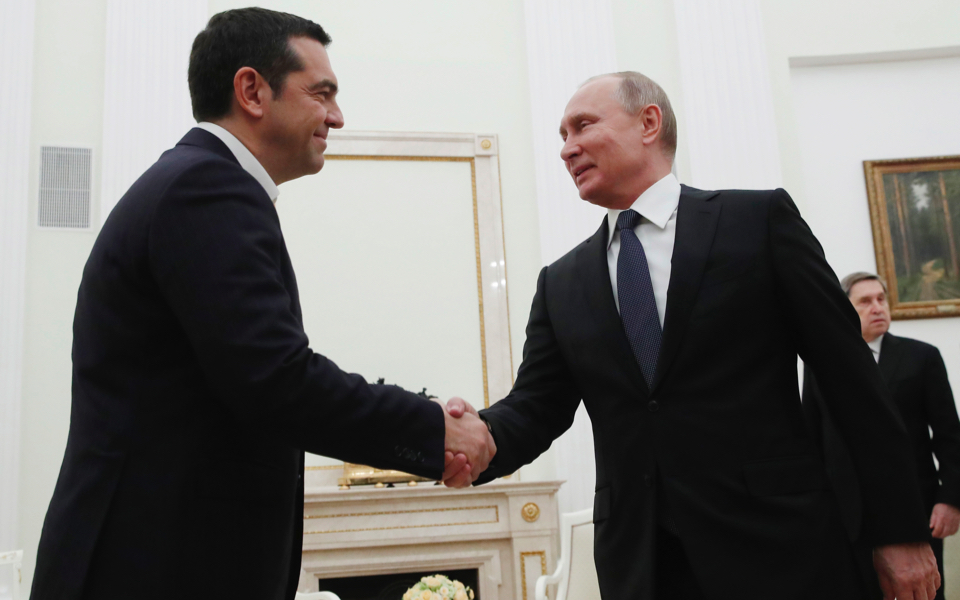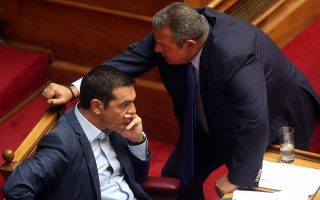Orthodox myths: Greece’s pragmatic approach towards Russia

In July it emerged that Greece had expelled two Russian diplomats and banned two more Russians from entering the country. From abroad this might have seemed surprising: the idea of Greece as a Russian ally inside the European Union is one that has never quite died away. But the Greek government was making a very specific statement about Russian efforts to undermine the Prespes Agreement between Greece and the Former Yugoslav Republic of Macedonia. Leaks from senior government officials in Athens even accused Moscow of attempting to destabilize the governing coalition by trying to bribe MPs from the junior partner, Independent Greeks (ANEL), which does not support the agreement.
Indeed, there is a pragmatism to Athens’s decisions that generally prevails over the supposed closeness between Greece and Russia. Their reputation as bedfellows in spirit if not in practice lingers on thanks to the common bonds of Orthodoxy and a popular view among Greeks that Russia has always backed Greece in its most difficult moments. Domestic anti-Americanism grew in the modern democratic era because of the perception that Washington was responsible for the Greek junta and the Turkish invasion of Cyprus. For their part, Greek politicians have often invoked Russia as part of a multidimensional foreign policy.
Even so, bilateral relations have never attained strategic level, and Athens has never become a privileged partner to Moscow. The figures tell their own story. The balance of trade sees a huge deficit for Greece, due to energy imports from Russia. Export of Greek products to Russia is anaemic, at around 1 percent of total exports. Russian direct investment in the Greek economy is of only marginal importance: 0.1 percent of all FDI and 0.2 percent of Russian direct investments abroad. Even tourist numbers are modest: in 2017 they reached 900,000 out of 27 million arrivals.
Greece and Russia have had their salad days, to be sure, in 2006-2008. But even then, the two countries achieved no real deepening or practical long-term gains. In an attempt to show that their cooperation was bearing fruit, capitalizing on the positive momentum, the two sides promoted energy and military agreements, such as the Burgas-Alexandroupoli oil pipeline, the South Stream natural gas project, and the purchase of 415 BMP-3 infantry combat vehicles, that have since lain dormant.
Relations with the Kremlin fell into further disrepair from 2010 to 2015, when Athens hunkered down to weather the economic storm. Russia remained mostly neutral on the impact of the financial crisis in Greece, providing no open support. As a result, relations with Moscow slipped down Athens’s agenda. Then as now, Russia understandably prioritizes its relations with the United States and the more powerful European Union member states, however rocky these can sometimes get. Moreover, with its own pressures at home and commitments abroad, including the crisis in Ukraine, Russia has had no reason to enter the negotiating fray between Greece and its creditors.
Some members of the first SYRIZA-ANEL government did not learn this lesson, however, thinking that Russia would provide economic assistance to mitigate European pressures. Others in the coalition saw Moscow as a counterweight in the negotiations, but never as a real alternative to lenders and partners for Greece. Worth noting here is the meeting of minds between the Orthodox camp and the communist camp, reflected in the presence in government of ANEL for the former and SYRIZA for the latter. The first saw in Moscow a patron power of Hellenism and Orthodoxy, and the second an opportunity to correct the “historical injustice” of the fall of the communist Soviet Union. Some individual government policies on Russia reflected this apparent realignment: the then new energy minister demonstrated an apparent obsession with promoting the Southern European Corridor (Turkish Stream) at all costs, against European desires and, mainly, without alliances or the necessary lobbying in Brussels.
Today, the climate has changed significantly. The SYRIZA-ANEL government has adopted an appreciably more prudent stance towards Brussels, showing considerable discipline in implementing EU decisions and participating more constructively in European developments. No longer under the tight supervision imposed on Greece from 2010 to 2018, the government is acting more predictably and more like a partner towards its Western allies.
Meanwhile Moscow’s alleged meddling in the FYROM name dispute has left Greek-Russian relations tense. Via leaks to the press, Athens alleged that Russia used material and financial incentives to try and influence municipalities and metropolitans (bishops), including pushing its agenda on Mount Athos. It cited the Imperial Orthodox Palestine Society and a former consul of Russia in Greece as key vehicles for this manipulation. Reports of a failed Russian attempt to bribe state officials also surfaced. In maintaining that its intentions toward Moscow are essentially good, in the wake of the Skripal affair Athens was at pains to point out that it did not go along with the policy of expulsions adopted by many Western states. Nevertheless, the charges that the Greek government levelled are grave and echo Western allegations of Russian interference in domestic affairs. A number of reasons lie behind the Greek government’s decision:
– Russian agents attempted to exploit northern Greek communities’ sensitivities to the pending issue between Greece and FYROM, playing on their religious and nationalistic reflexes;
– to issue a warning shot to discourage others from attempting to undermine the Prespa Agreement, which – despite negative reactions – is a core part of what the current government hopes to leave as its political legacy;
– to make a gesture of good will towards Washington, given the “honeymoon” period the two sides are now enjoying, confirming Athens’ firm Western orientation;
– to stigmatise those who disagree with the compromise with FYROM, identifying them with outside interests and thus somewhat mitigating domestic doubt/opposition.
Even if Greece and Russia have never really had their own honeymoon in modern times, Athens’s accusations nevertheless have even greater weight because Greece has long borne the reputation of being positively inclined towards Russia. This lends credence to those accusing Russia of being a revisionist power.
The Greek government has dialled down its rhetoric since the expulsions, releasing official statements in favor of rapprochement. But the Russian leadership now appears to see Athens as a long arm of Washington: at the height of the dispute in July, Russia blamed the United States for the deterioration in Greek-Russian relations. Still, it does not want to break ties completely. With its relations with Turkey becoming more strategic in nature (energy, trade, and revisionism are common denominators), Russia needs to maintain a balance – with both Greece and Cyprus – in securing its enhanced position in the eastern Mediterranean. The mood in Greek-Russian relations has therefore shifted from neutral-positive to neutral-negative, but prime minister, Alexis Tsipras’s visit to Moscow in December is already creating a more positive atmosphere. The recent resignation of the foreign minister, Nikos Kotzias, should also alter things; the July crisis had begun to take on the nature of a campaign between Kotzias and Russia. After the expulsions, Kotzias publicly accused Russia of being Turkey’s “comrade-in-arms” and of betraying the level of Greek-Russian friendship attained over the past 190 years, insinuating that Moscow and Ankara were joining forces against Athens.
Despite the obvious limitations in Greek-Russia relations, a further deterioration would serve no purpose, particularly at a time of general fluidity and in the midst of Greece’s attempt to return to normality and attract investment. Athens needs to be careful to avoid finding itself part of opportunistic joint ventures that Russian might perceive as aggressive in nature, be it against Russia itself, or Iran. That said, even in Kotzias’s harshest words he alluded to a supposed closeness between Greece and Russia. Under certain circumstances Athens may still find it difficult to take a firm stance against Moscow, given the latter’s assertiveness and the confrontational trend in Western-Russian relations.
Constantinos Filis is Research Director of the Institute of international Relations in Athens, Greece. He is a specialist in Russian and former-Soviet affairs and a strategic planning expert on Greek foreign policy.





